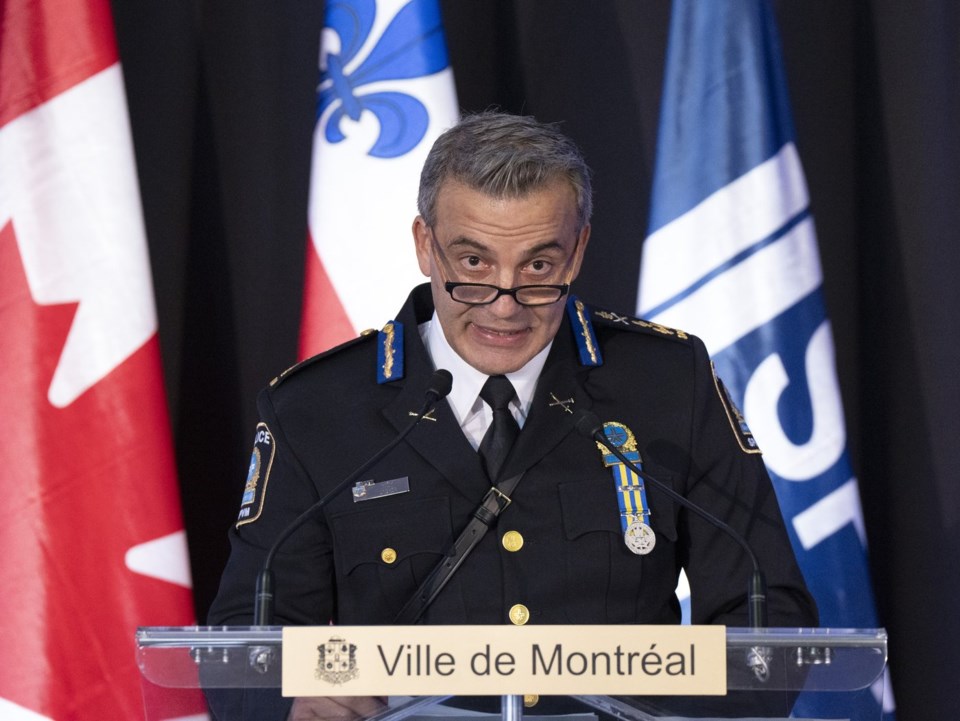MONTREAL — Montreal's police chief has asked his officers to change how they behave when they stop people on the street, the latest effort by the police to frame street checks amid calls to have them banned altogether.
“We made a commitment to update the policy to better define the practice and improve communication with citizens,” police chief Fady Dagher told reporters during a news conference on Monday, adding the new policy on street checks takes effect immediately.
The policy would require officers to inform citizens why they are being stopped and to make it clear they're free to leave at any time.
“We want to make sure that you don’t have any perception that you’re being detained,” Dagher said.
Police officers will have to document the details of the stop, and that data will be analyzed by authorities, Dagher said. That part will go into effect in the fall once computer upgrades are complete.
Without the data, Dagher said they would have a hard time knowing how officers are behaving in the field.
The police force said it is hopeful the measures will also improve communication between officers and the person stopped. It said street checks remain an important tool for police.
Some advocacy groups like the Black Coalition of Quebec and Ligue des droits et libertés, a local human rights organization, say the new policy comes after years of complaints and doesn't go far enough.
The league described the latest policy change as a "half-measure" that came about because of heavy pressure from groups, but adds "there is a world of difference between a policy on paper and the reality on the street."
Lynda Khelil, a spokeswoman for the league, said police should go further and explicitly tell those who are stopped "that they have no legal obligation to identify themselves and answer questions."
The league said more than 100 community organizations signed a letter in 2023 calling for a ban on street checks instead of trying to regulate them.
Fo Niemi, director of the Center for Research-Action on Race Relations, said there's a delicate balance between valid grounds for a stop — reasonable suspicions — with the right to protect ordinary and innocent citizens from being stopped without legal justifications.
"The success of this policy will depend on what kind of clear, if not mandatory, training to all officers about how to better communicate with ordinary people, people of different backgrounds, different capacity of understanding, even language barriers," Niemi said
"And communicate in such a way that (the interaction) will not result in something worse, and that's always a challenge."
The Black Coalition of Quebec said the new policy was a step in the right direction, but isn't the same as a law or a rule that has a "normative and coercive value."
It called for a provincial law that would apply to all police forces outlawing systemic racism — an entrenched practice that François Legault's Coalition Avenir Québec has refused to acknowledge.
Authorities had pledged to address public concerns about street checks after an independent 2019 report revealed Indigenous people, Black Montrealers and people of Arab descent were more likely to be randomly stopped by police.
In 2020, Montreal police developed a new policy that banned street checks “based on discriminatory criteria” and required officers to explain their reasons for stopping citizens, among other measures aimed at reducing racial disparities.
The province followed with guidelines that mirrored Montreal police policy: that the practice of stopping citizens to collect and record their personal information shouldn’t be random, unfounded or discriminatory.
The provincial guidelines say that while stops are essential for public safety, they must be based on observable facts or information that gives police reasonable grounds to intervene.
A report released in 2023, using data from 2021, showed little had changed: Indigenous Montrealers were six times more likely to be stopped than were white people in the city.
The report called for a moratorium on street checks, which Dagher refused, saying any such action would be symbolic.
The data also demonstrated that Black people were three-and-a-half times more likely to be stopped than white people and Arabs were two-and-a-half times more likely to be stopped.
The new policy change will be presented to the city's public security commission on Wednesday night, when citizens will have a chance to raise questions.
This report by The Canadian Press was first published May 27, 2025.
Sidhartha Banerjee, The Canadian Press




